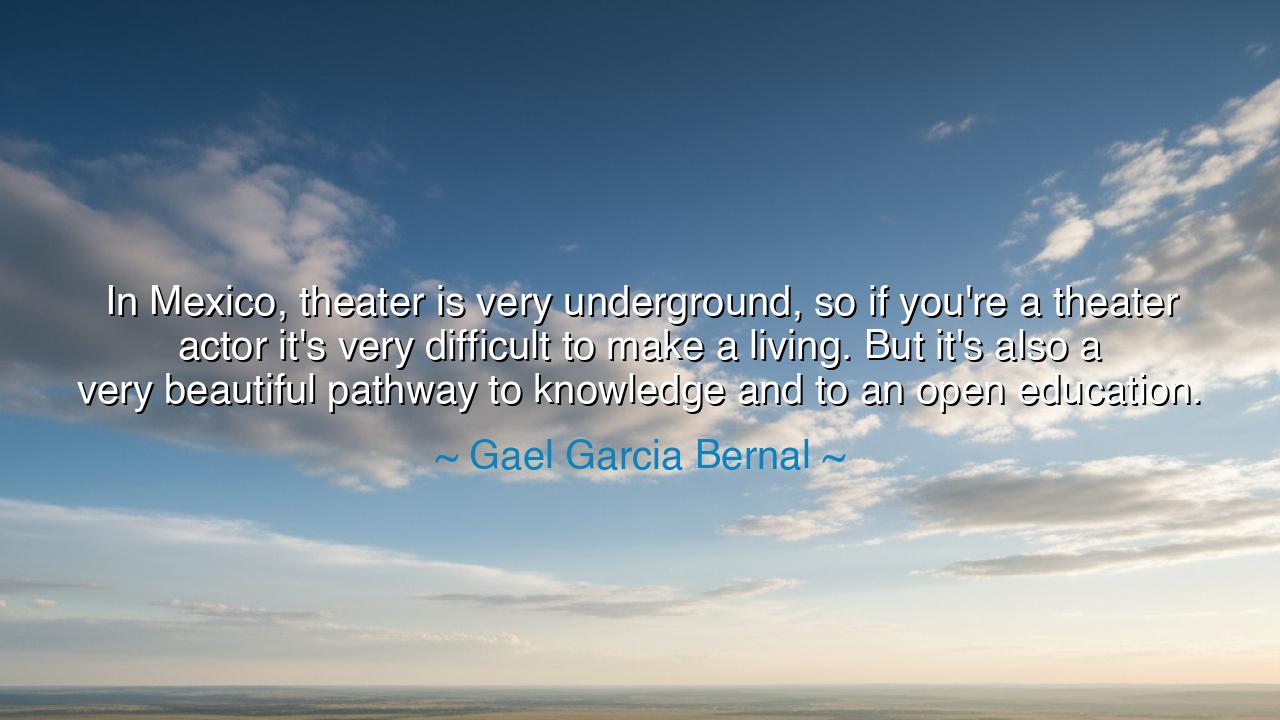
In Mexico, theater is very underground, so if you're a theater
In Mexico, theater is very underground, so if you're a theater actor it's very difficult to make a living. But it's also a very beautiful pathway to knowledge and to an open education.






The actor, director, and philosopher of art Gael García Bernal, a son of Mexico and a voice for its creative spirit, once spoke with quiet truth: “In Mexico, theater is very underground, so if you're a theater actor it's very difficult to make a living. But it's also a very beautiful pathway to knowledge and to an open education.” In this statement lies both the hardship and the holiness of art—the recognition that the pursuit of creativity often demands sacrifice, yet offers riches of another kind: the wealth of understanding, the depth of wisdom, and the freedom of the soul. Bernal’s words rise from the soil of his homeland, where theater, though hidden from glory and profit, remains a sanctuary of thought, emotion, and truth.
The origin of this quote can be found in Bernal’s own journey as a performer. Before he was known to the world as a filmmaker and actor in acclaimed films, he began on the humble stages of Mexican theater. There, beneath dim lights and before small crowds, he learned not only how to perform but how to observe the human condition—how to listen to voices that society ignored and to tell stories that the world had forgotten. He discovered that the stage, though modest, is a temple of learning, where one studies not from books alone, but from the living pulse of humanity itself. For Bernal, the beauty of the underground was not its obscurity, but its purity—it was art for its own sake, uncorrupted by fame or fortune.
In saying that theater is “a beautiful pathway to knowledge and to an open education,” Bernal speaks of the kind of wisdom that transcends classroom walls. True education, he implies, is not confined to institutions or titles, but is awakened in the heart that dares to see the world through another’s eyes. On the stage, an actor must live a thousand lives, each with its joys, its sorrows, its contradictions. Through this sacred act of empathy, one comes to know the diversity of the human spirit—the way love burns, fear trembles, and hope endures. Theater, in this sense, is a mirror and a lantern—it reflects who we are and illuminates what we may become.
The ancient Greeks understood this well. In the theaters of Athens, beneath the open sky, citizens gathered not merely to be entertained but to be enlightened. Playwrights like Sophocles and Euripides were philosophers in disguise, teaching their audiences about justice, fate, and virtue through story and song. These performances were not idle diversions; they were public acts of education. To see Antigone defy the king for the sake of conscience was to confront the eternal conflict between law and morality. Thus, even in ancient times, the theater was the school of the soul—a place where society came to examine itself. Bernal’s words echo this lineage: that in every era, art remains the true university of humanity.
And yet, Bernal also acknowledges the struggle of the artist—the hardship of those who labor for love, not for gain. In Mexico, as in many lands, the theater is underground, sustained by passion rather than profit. Actors and playwrights often survive on little, yet their work feeds the spirit of the nation. It is the eternal paradox of art: that what is least rewarded by the world is often most essential to its heart. The artist’s poverty is a mirror of his purity; in the absence of wealth, he finds a different treasure—the wealth of understanding, of expression, of connection to the divine pulse of creation.
O listener, learn from this: the path of knowledge is not always paved with gold, nor is it always visible to the crowd. Sometimes, it winds through the hidden corridors of art, through the underground of thought and feeling, where the brave and the curious go to find themselves. To walk this path requires courage—to choose truth over comfort, purpose over profit, and learning over applause. But those who do so, as Bernal teaches, gain a reward greater than any coin: the open education of the heart, which sees not only with the eyes but with the spirit.
So, let the words of Gael García Bernal be a guide for all seekers, artists, and dreamers: do not measure the worth of your path by the ease of your journey. Even if your calling leads you underground, follow it with faith. For wherever the pursuit of truth and beauty takes you, there you will find knowledge, there you will find freedom, and there you will find the unending education of life itself. The stage may be small, the audience few, but the light that burns within such work shines brighter than any star.






AAdministratorAdministrator
Welcome, honored guests. Please leave a comment, we will respond soon